The Emotion Each Myers-Briggs® Personality Type Struggles to Express
Are there certain emotions that you express with ease that others seem to conceal with every possible effort? Or is it the reverse? Maybe you feel like concealing emotions that others have no issue showing! Everyone experiences emotions. It doesn’t matter what your personality type is, the whole gamut of emotions is there for everyone to dive into at various points in their lives. Every type feels these emotions and many more on a regular basis, but they may try to hide them from others for various reasons. Which emotion do you struggle to express? Find out in today’s article!
Some General Trends:
When I surveyed my Twitter followers and email list, I noticed some trends.
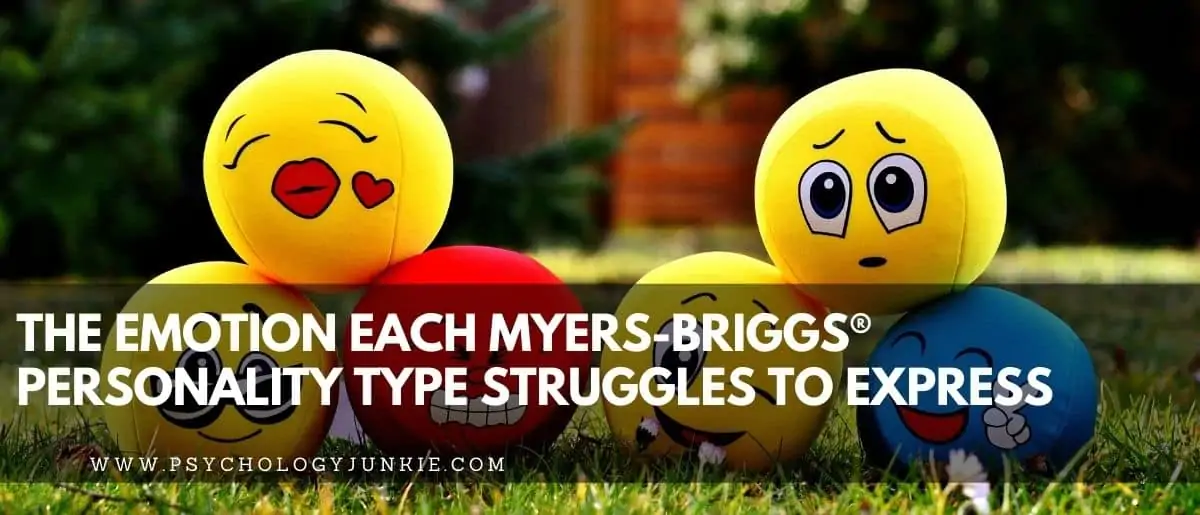
Introverts struggled to express loud, strong, physical or verbal reactions.
Extroverts struggled to express deeper inner feelings that were negative or very personal.
Feelers struggled to express anger.
Thinkers struggled to express feelings of adoration.
Everyone, for the most part, struggled to express vulnerability or shame, though some types mentioned it more than others.
Be aware that everyone is unique and one-of-a-kind. You may struggle with all sixteen of these emotions or none at all based on your life experience, mental health, and well-being. If I say, as I did above, that extroverts tend to struggle with expressing deep inner feelings – this does not mean that you will absolutely struggle here. These are simply trends and patterns that I’ve noticed over time and through feedback of the people I surveyed. There will always be individuals who go against the grain for their type!
Not sure what your personality type is? Take our new personality questionnaire here. Or you can take the official MBTI® here.
Table of contents
- Some General Trends:
- Here’s the Emotion Each Myers-Briggs® Personality Type Struggles to Express
- The ENFP – Sadness
- The ENTP – Insecurity
- The INFP – Anger
- The INTP – Affection
- The ENFJ – Internal Anguish
- The ENTJ – Sympathy
- The INFJ – Abandon
- The INTJ – Affirmation
- The ESFP – Despair
- The ESTP – Fear
- The ISFP – Fury
- The ISTP – Anxiety
- The ESFJ – Embarrassment
- The ESTJ – Hurt
- The ISFJ – Resentment
- The ISTJ – Vulnerability
Estimated reading time: 9 minutes
Here’s the Emotion Each Myers-Briggs® Personality Type Struggles to Express
The ENFP – Sadness
When people talk about ENFPs, there is often something said about unicorns, rainbows, or butterflies. These types are often perceived as being perpetually sunny and enthusiastic. But are they really? The ENFPs I’ve known have had a wide variety of nuanced emotions, but they’re choosy about who they share the darker ones with. They feel uncomfortable sharing vulnerable emotions unless they know someone and trust them implicitly. Many ENFPs have told me that their friends expect them to be upbeat all the time, and they don’t want to disappoint them, so they push down their more vulnerable emotions and try to project an air of positivity and enthusiasm.
“I’m an ENFP, and I personally have a hard time showing that people have hurt me. Crying is definitely not something I do. I don’t think it’s a weakness, but I struggle to allow people to have that power over me I guess…” – Hope, @smol_hope_118 on Twitter
Read This Next: Dealing with Emotional Overwhelm as an ENFP
The ENTP – Insecurity
ENTPs are often thought of as being self-assured, quick thinking and thick-skinned. They’re the types who easily find holes in everything you say, but they do it so rapidly and with such good humor that you don’t really mind! The truth is, ENTPs experience insecurity as much as the next person most of the time. However, they find it incredibly difficult to talk about this side of themselves. They will try to make jokes or poke at their insecurities, but they won’t usually directly address it if they can help it.
Read This Next: 12 Amazing Fictional ENTP Characters
The INFP – Anger
INFPs live in a world of vivid, nuanced reflections and emotions. They are highly attuned to how other people feel and are sensitive to any influence they have on other people’s emotions. Expressing anger for someone as private as an INFP can feel very awkward and uncomfortable. They tend to feel embarrassed confronting someone or telling them that they don’t like a certain behavior. Usually they try to work out their feelings themselves or repress their anger, but this can backfire and lead to passive-aggression which can cause even more damage than directness would have in the first place.
“Anger, hands-down, is the hardest emotion for me to express. I fear it’ll escalate the situation and get out of control, or I’ll cause an irreconcilable rift between the other person, coupled with ongoing hostility and/or resentment.” – @MarathonMatson, Twitter User
Read This Next: Understanding INFP Rage
The INTP – Affection
Quiet and studious, INTPs enjoy understanding the inner workings of the world around them. They can express ideas and theories with a fervor and excitement that borders on giddiness, but when it comes to people, they can feel less sure of themselves. People operate with so many unpredictable emotions and opinions that it can feel for INTPs like they’re walking on a minefield and never know what will trigger an eruption. They aren’t always sure how to express positive feelings or devotion and the fear of rejection can leave them tight-lipped. Sharing the depths of their love for someone can feel embarrassing to them, too, and they tend to wait until the last minute to do so.
Read This Next: 12 Fictional Characters You’ll Relate to If You’re an INTP
The ENFJ – Internal Anguish
When ENFJs are with a very close friend or loved one they may vent about their annoyances or frustrations. But they will usually quickly revert back into a more positive mood. They aren’t usually comfortable expressing or talking about their deeper negative emotions because they feel responsible for other people’s feelings and don’t want to be a bother. They often worry that they’ll kill the mood, be a burden, or appear selfish by talking about their own pain.
Read This Next: 12 Amazing Fictional ENFJs
The ENTJ – Sympathy
ENTJs believe in solving problems, not whining about them. When they are confronted with someone who is sad or upset it can feel very awkward to them. First they will confront the problem head-on, attempting to solve the issue at hand. If this doesn’t work they may try to spout what they think might be a helpful platitude before quickly exiting the scene. My own ENTJ father used to say a few vague words of comfort, shrug, and come up with an excuse to leave the room as quickly as possible.
The INFJ – Abandon
INFJs have moments of deeply-felt gladness in life, but when it comes to expressing it, they can suddenly feel caged up or vulnerable. They may put on a calm happy face because they want to celebrate with others, while inside feeling flustered or awkward. Jumping up and down with glee, crying publicly, or expressing loud, unabashed, unafraid emotions is not something that comes easily to this type.
“Joy, happiness, sadness, anything where my emotions are really intense and visible to others stresses me out. I can feel those things and express them, but it tends to not be in its raw, unfiltered form.” – Dan, an INFJ
Read This Next: How INFJs Process Emotions
The INTJ – Affirmation
INTJs often hide their vulnerable or emotional side behind a mask of stoicism. They are the types to let their behavior speak for them, rather than put their feelings into words. This can be frustrating for a friend or significant other who needs a pat on the back or a reassuring “You can do this.” INTJs would much rather offer practical advice than just say “I appreciate you.” However, they might offer a gift or gesture of some other kind to affirm the people they love. As INTJs grow and age, they usually develop more comfort around giving affirmations or praise, but it still doesn’t tend to flow as freely for them as it does for many other types.
“Love, it’s extremely difficult for me to say anything related to it, which I think is abnormal. My ways of showing affection is physically doing some work.” – @rogueINTJ, INTJ Twitter User
Read This Next: The Underrated Kindness of the INTJ Personality Type
The ESFP – Despair
ESFPs are often capable of seeing the bright side in any situation, but this doesn’t mean they never feel sad or anguished. They may feel embarrassed by these emotions and try to express them in indirect ways. Rather than admit they aren’t okay, they may joke around or try to change the subject altogether. Many times, they process their deeper feelings alone or with one chosen person who has earned their complete trust.
The ESTP – Fear
ESTPs often have an aura of dauntlessness and strength, but that doesn’t mean they are never afraid. They tend to overcome their fears fairly quickly, but it can be awkward for them to admit that they’re scared in the first place. They may try to joke about being cowardly or pretend to be less sensitive than they really are. They generally avoid discussing vulnerable feelings, so when someone asks them how they are, they may pretend everything is fine even when it’s not.
The ISFP – Fury
While ISFPs can certainly feel great depths of anger, it’s difficult for them to come right out and admit to it in person. They may experience rage at injustices they see in the world, but they are often reluctant to verbally set boundaries with people. They are usually more comfortable venting their feelings by writing or through other forms of art rather than verbally hashing them out with others. They also may just withdraw from a conversation that’s angering them instead of verbalizing their anger.
Read This Next: 10 Things You Should Never Say to an ISFP
The ISTP – Anxiety
ISTPs often keep their stress and anxiety hidden from the world, preferring to focus on what they can do rather than what they feel. They may try to mask their stress with a facade of cool calmness and suppress negative emotions rather than talk about them. This can be frustrating for people who love them since they aren’t likely to come straight out and ask for help and their outside appearance can seem unreadable.
Read This Next: What ISTPs Do When They’re Really Stressed Out
The ESFJ – Embarrassment
ESFJs, like any other personality type, are capable of feeling embarrassed, but they may not admit it. The idea of doing something socially unacceptable is hard enough, but talking about the fallout afterwards would make things even worse. Instead, they try to downplay their feelings and pretend everything is fine. Their loved ones may notice them laughing a little too hard at something that isn’t particularly funny, just to hide the fact that they feel awkward and uncomfortable.
The ESTJ – Hurt
While ESTJs are capable of feeling hurt (just like anyone), it can be hard for them to admit. If someone has said or done something that made them feel feel devalued or disregarded, they aren’t likely to open up about those feelings right away. They’re more likely to become defensive, argumentative, or quiet. While it’s not a hardship for them to admit when someone has done something illogically or inefficiently, admitting out loud to being emotionally hurt feels incredibly vulnerable and even embarrassing for them.
The ISFJ – Resentment
For ISFJs, it can be difficult to admit that they are angry or resentful. They often try to keep their feelings under wraps and then become overwhelmed when they finally explode. Either that, or they journal their feelings or look for some other indirect way of expressing them. They may feel too vulnerable to tell anyone how they feel, since it would mean revealing a deep secret or making a big change in their life. They often try to let things go without risk of damaging relationships when possible. However, as they mature and develop in healthy ways, they gain more comfort with expressing when someone has hurt them.
Read This Next: 7 Reasons Why You Need an ISFJ Friend in Your Life
The ISTJ – Vulnerability
ISTJs, much like Professor Snape in the Harry Potter series, are not big fans of vulnerability. While they may look one way on the outside, they may feel completely differently on the inside. While they are very capable of feeling deeply, coping with these feelings in a transparent way is often difficult for them. They may try to cover up how they feel or pretend to be fine even when they aren’t. What this looks like on the outside can be cold stoicism, sarcasm, or even calmness. They also tend to bottle up their emotions instead of confronting or expressing them directly, which can lead to disillusionment or pent-up stress. As ISTJs get older and develop more life experiences, they typically become better at expressing their feelings, but it still tends to feel less simple for them than it would for certain other personality types.
Read This Next: What ISTJs Do When They’re Really Stressed Out
What Are Your Thoughts?
Did you enjoy this article? Do you have any insights or experiences you’d like to share? Let us (and other readers) know in the comments!
Find out more about your personality type in our eBooks, Discovering You: Unlocking the Power of Personality Type, The INFJ – Understanding the Mystic, The INTJ – Understanding the Strategist, and The INFP – Understanding the Dreamer. You can also connect with me via Facebook, Instagram, or Twitter!
Subscribe to Our Newsletter

Want to discover more about personality type? Get the inside scoop with Susan Storm on all things typological, along with special subscriber freebies, and discounts on new eBooks and courses! Join our newsletter today!




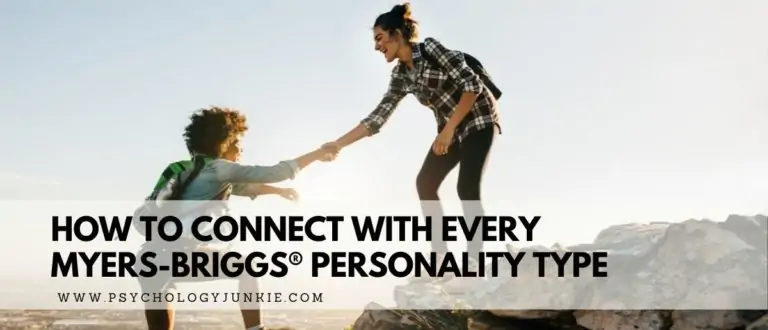
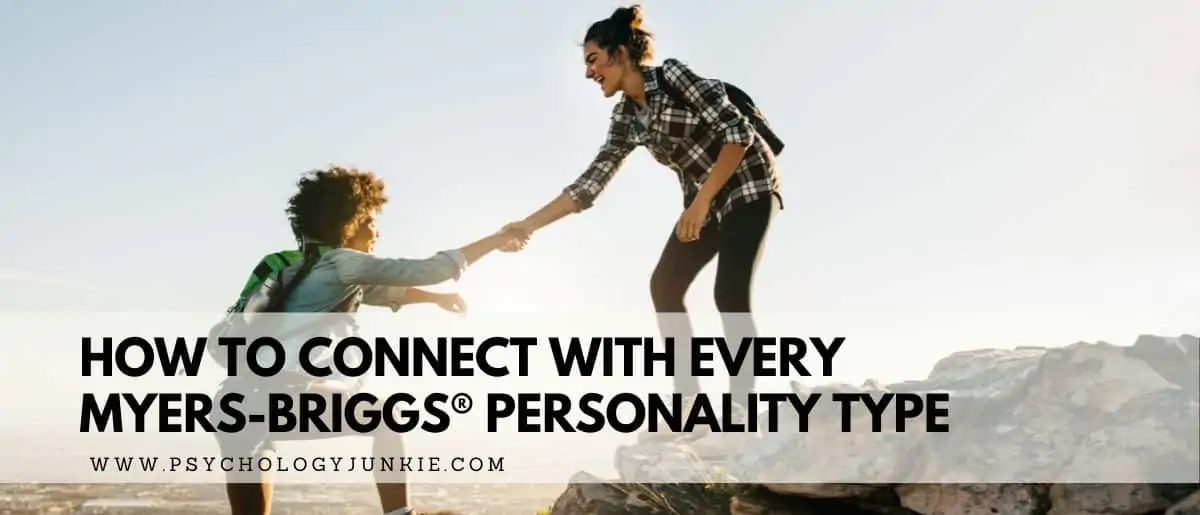



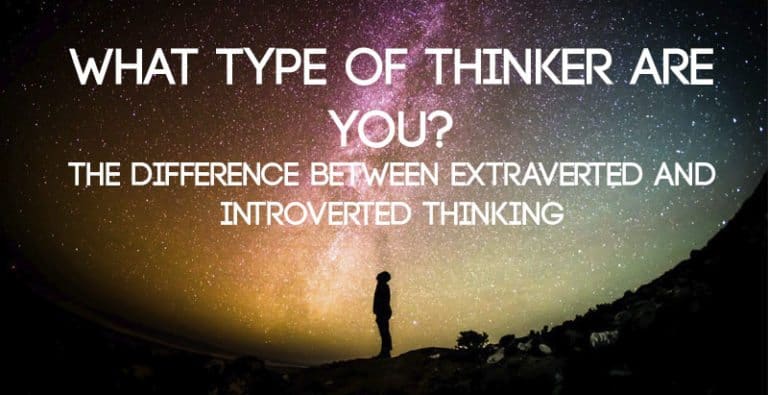
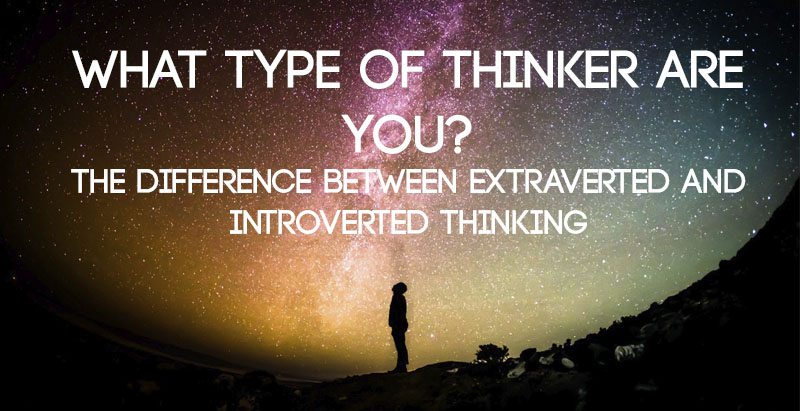

Very interesting! I’m an INFP but for some reason I related a LOT with the INTP and even ESTJ (go figure!) in this post. Showing affection and hurt is very weird and unnatural and foreign for me. The latter may have to do with the fact that, as a 4w3 (probably, at least) the 3 in me wants to appear confident and not show hurt. But really any strong emotions… I find it hard to express them unless I’m by myself or with people very close to me.
In fact, I tend to come across as an introverted Thinker when it comes to expressing emotions. If any other INFPs relate, let me know, lol!
ESTJ here. Yes, very spot on about not wanting to show how hurt I am by someone’s actions. One of my best friends blew up at me over a game and I played it off like they were being ridiculous, but in a funny way. I was incredibly embarrassed and hurt to be treated that way but I never said anything to her. I just tried to let love cover over and tried to understand that she didn’t try to hurt me, she was just amped up in the moment during the game. I’m over it now, but it took me years to get fully over it.
It’s great to get to know every types emotion so it helps them to understand themselves better, thank you Susan for this article☺️
This article is really helpful on the surface, since it contemplates the feeling held by each types and getting to acknowledge them, thank you Susan☺️
As an ENFP myself, I found it interesting that you put sadness and not anger for the hardest emotion to express, as sadness is much easier for me than anger. I do realize that people view me as bright and sunny and I don’t expect most of my friends to know about my sad side, but sadness isn’t a difficult emotion for me. It’s actually getting easier for me to show my sadness to others I am close to. But anger? That is an emotion that is very foreign to me. I think people are surprised to hear that I get angry at all. If I have a choice between getting sad and getting mad about a situation, the choice is usually sad. I am starting to embrace all my emotions though, including anger.